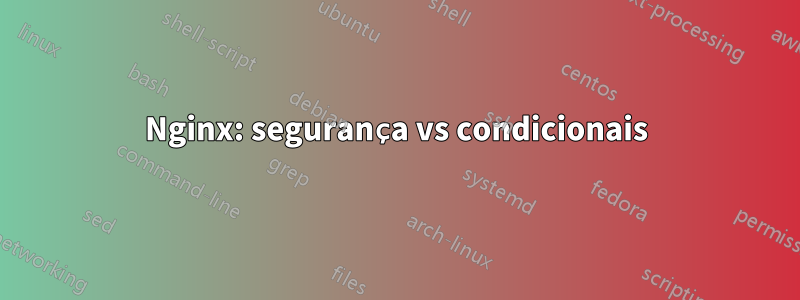
Eu estava lendo em busca de algumas etapas de segurança que podem ser executadas no Nginx para proteger os aplicativos que estou servindo usando o Nginx como proxy reverso. Encontrei este código que contém algumas coisas boas para proteger sites, mas está cheio de condicionais e a documentação me desencorajou de usá-los.
Minhas perguntas aos especialistas em Nginx:
- Existe uma maneira melhor de fazer isso?
- Existe um trecho comumente usado como este em algum lugar que elimina as condicionais?
- Eu preciso disso?
Conselho apreciado.
## Block SQL injections
set $block_sql_injections 0;
if ($query_string ~ "union.*select.*\(") {
set $block_sql_injections 1;
}
if ($query_string ~ "union.*all.*select.*") {
set $block_sql_injections 1;
}
if ($query_string ~ "concat.*\(") {
set $block_sql_injections 1;
}
if ($block_sql_injections = 1) {
return 403;
}
## Block file injections
set $block_file_injections 0;
if ($query_string ~ "[a-zA-Z0-9_]=http://") {
set $block_file_injections 1;
}
if ($query_string ~ "[a-zA-Z0-9_]=(\.\.//?)+") {
set $block_file_injections 1;
}
if ($query_string ~ "[a-zA-Z0-9_]=/([a-z0-9_.]//?)+") {
set $block_file_injections 1;
}
if ($block_file_injections = 1) {
return 403;
}
## Block common exploits
set $block_common_exploits 0;
if ($query_string ~ "(<|%3C).*script.*(>|%3E)") {
set $block_common_exploits 1;
}
if ($query_string ~ "GLOBALS(=|\[|\%[0-9A-Z]{0,2})") {
set $block_common_exploits 1;
}
if ($query_string ~ "_REQUEST(=|\[|\%[0-9A-Z]{0,2})") {
set $block_common_exploits 1;
}
if ($query_string ~ "proc/self/environ") {
set $block_common_exploits 1;
}
if ($query_string ~ "mosConfig_[a-zA-Z_]{1,21}(=|\%3D)") {
set $block_common_exploits 1;
}
if ($query_string ~ "base64_(en|de)code\(.*\)") {
set $block_common_exploits 1;
}
if ($block_common_exploits = 1) {
return 403;
}
## Block spam
set $block_spam 0;
if ($query_string ~ "\b(ultram|unicauca|valium|viagra|vicodin|xanax|ypxaieo)\b") {
set $block_spam 1;
}
if ($query_string ~ "\b(erections|hoodia|huronriveracres|impotence|levitra|libido)\b") {
set $block_spam 1;
}
if ($query_string ~ "\b(ambien|blue\spill|cialis|cocaine|ejaculation|erectile)\b") {
set $block_spam 1;
}
if ($query_string ~ "\b(lipitor|phentermin|pro[sz]ac|sandyauer|tramadol|troyhamby)\b") {
set $block_spam 1;
}
if ($block_spam = 1) {
return 403;
}
## Block user agents
set $block_user_agents 0;
# Don't disable wget if you need it to run cron jobs!
#if ($http_user_agent ~ "Wget") {
# set $block_user_agents 1;
#}
# Disable Akeeba Remote Control 2.5 and earlier
if ($http_user_agent ~ "Indy Library") {
set $block_user_agents 1;
}
# Common bandwidth hoggers and hacking tools.
if ($http_user_agent ~ "libwww-perl") {
set $block_user_agents 1;
}
if ($http_user_agent ~ "GetRight") {
set $block_user_agents 1;
}
if ($http_user_agent ~ "GetWeb!") {
set $block_user_agents 1;
}
if ($http_user_agent ~ "Go!Zilla") {
set $block_user_agents 1;
}
if ($http_user_agent ~ "Download Demon") {
set $block_user_agents 1;
}
if ($http_user_agent ~ "Go-Ahead-Got-It") {
set $block_user_agents 1;
}
if ($http_user_agent ~ "TurnitinBot") {
set $block_user_agents 1;
}
if ($http_user_agent ~ "GrabNet") {
set $block_user_agents 1;
}
if ($block_user_agents = 1) {
return 403;
}
Responder1
Esta configuração verifica apenas parâmetros de obtenção. Mas sqli ou lfi cat podem ser explorados via post, cookie ou até mesmo cabeçalhos e arquivos http. A melhor maneira é usar WAF (firewall de aplicativo da web), exinsira a descrição do link aqui.
Mas não existe um WAF ideal, é apenas uma linha de proteção. Certifique-se de validar a entrada dos usuários, limpar a saída, usar instruções preparadas para consultas SQL e seguir outras boas práticas


